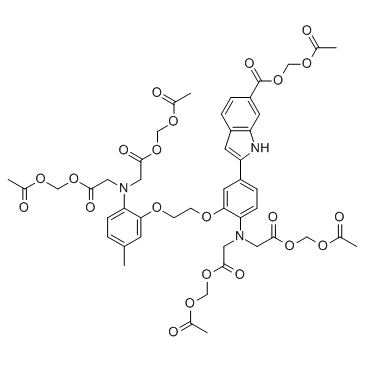Propofol-induced modifications of cardiomyocyte calcium transient and sarcoplasmic reticulum function in rats.
T Guenoun, O Montagne, M Laplace, B Crozatier
Index: Anesthesiology 92(2) , 542-9, (2000)
Full Text: HTML
Abstract
Propofol is considered to be an anesthetic agent with few or no negative inotropic effects. This study evaluated a possible direct depressant effect of propofol on sarcoplasmic reticulum Ca2+ accumulation and cardiomyocytes.The effects of propofol on intracellular Ca2+ transients were evaluated in isolated rat cardiomyocytes using a microfluorometric technique with Indo-1. Sarcoplasmic reticulum function was also assessed by measuring the oxalate-stimulated Ca2+ uptake from homogenates of rat ventricles.The Ca2+ uptake capacity of the sarcoplasmic reticulum was decreased by propofol (10(-4) M). Large concentrations of propofol decreased the rate of decrease of the intracellular Ca2+ transient, which resulted in an increase of diastolic Ca2+ when the diastolic interval was decreased. The increased diastolic Ca2+ also resulted in a decrease in Ca2+ transient. This effect appeared for lower doses (10(-5) M) after a short diastolic pause rather than after a long (2- to 3-min) rest (appearing at 10(-4) M).For doses more than 10(-5) M, propofol induces a Ca2+ uptake capacity impairment of the sarcoplasmic reticulum. This is probably responsible for a slowing of the decrease of the Ca2+ transient, which in turn increases the diastolic Ca2+ for high heart rate. These diastolic modifications may participate in the slight negative inotropic effect of the drug.
Related Compounds
| Structure | Name/CAS No. | Molecular Formula | Articles |
|---|---|---|---|
 |
Indo-1 AM
CAS:112926-02-0 |
C47H51N3O22 |
|
Quantitative TCR:pMHC Dissociation Rate Assessment by NTAmer...
2015-07-01 [J. Immunol. 195 , 356-66, (2015)] |
|
Identification of Rare High-Avidity, Tumor-Reactive CD8+ T C...
2015-05-15 [Cancer Res. 75 , 1983-91, (2015)] |
|
Pharmacological analysis by HOE642 and KB-R9032 of the role ...
2000-10-01 [Br. J. Pharmacol. 131(3) , 638-44, (2000)] |
|
Cytosolic and mitochondrial [Ca2+] in whole hearts using ind...
1996-06-01 [Biophys. J. 70(6) , 2571-80, (1996)] |
|
Calcium signaling in airway smooth muscle cells is altered b...
1998-09-01 [Am. J. Respir. Cell. Mol. Biol. 19(3) , 437-44, (1998)] |